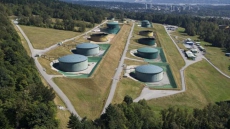MONTREAL — Candu Energy, a division of SNC-Lavalin, has signed a joint venture agreement with China National Nuclear Corporation to build nuclear reactors in China.
The framework deal was signed over the weekend in Beijing during Prime Minister Stephen Harper's state visit to China.
It follows a memorandum of understanding signed between the two companies in July to build reactors in China and seek other global opportunities.
Each advanced fuel Candu reactor (AFCR) can use the spent fuel from four light water reactors, creating a large potential market, Candu said Monday.
China operates 22 nuclear power reactors, including two Candu 6 reactors at Qinshan that have been in commercial operation for more than a decade. The country has 26 reactors under construction and others under proposal.
The joint venture follows a supportive recommendation last week from a Chinese Expert Panel Review on AFCR technology, and a memorandum of understanding signed Saturday between Natural Resources Canada and the China National Energy Administration to collaborate on civilian nuclear energy including the development and export of advanced fuel reactors.
Meanwhile, SNC-Lavalin (TSX:SNC) lost a long-term contract it has had for a decade to manage 3,800 federal government buildings, facilities and properties across Canada.
Ottawa says it has awarded contracts worth up to $9.6 billion to Brookfield Johnson Controls Canada, a joint venture between Johnson Controls and Brookfield Property Partners.
The contract which starts when SNC's contract expires in March is for an initial eight years but can be extended for up to six more years, raising the total price to $22.8 billion.
Analyst Benoit Poirier of Desjardins Capital Markets said the contract loss is "slightly negative." It is believed to be one of the less profitable contracts in SNC-Lavalin's operations and maintenance division. He said the loss could reduce SNC-Lavalin's annual earnings by four to seven cents per share or cut the company's share price by up to $1.
SNC-Lavalin announced last week that it is moving quickly to cut its global workforce by 4,000, including about one quarter in Canada, as it adjusts to underperforming business segments.






